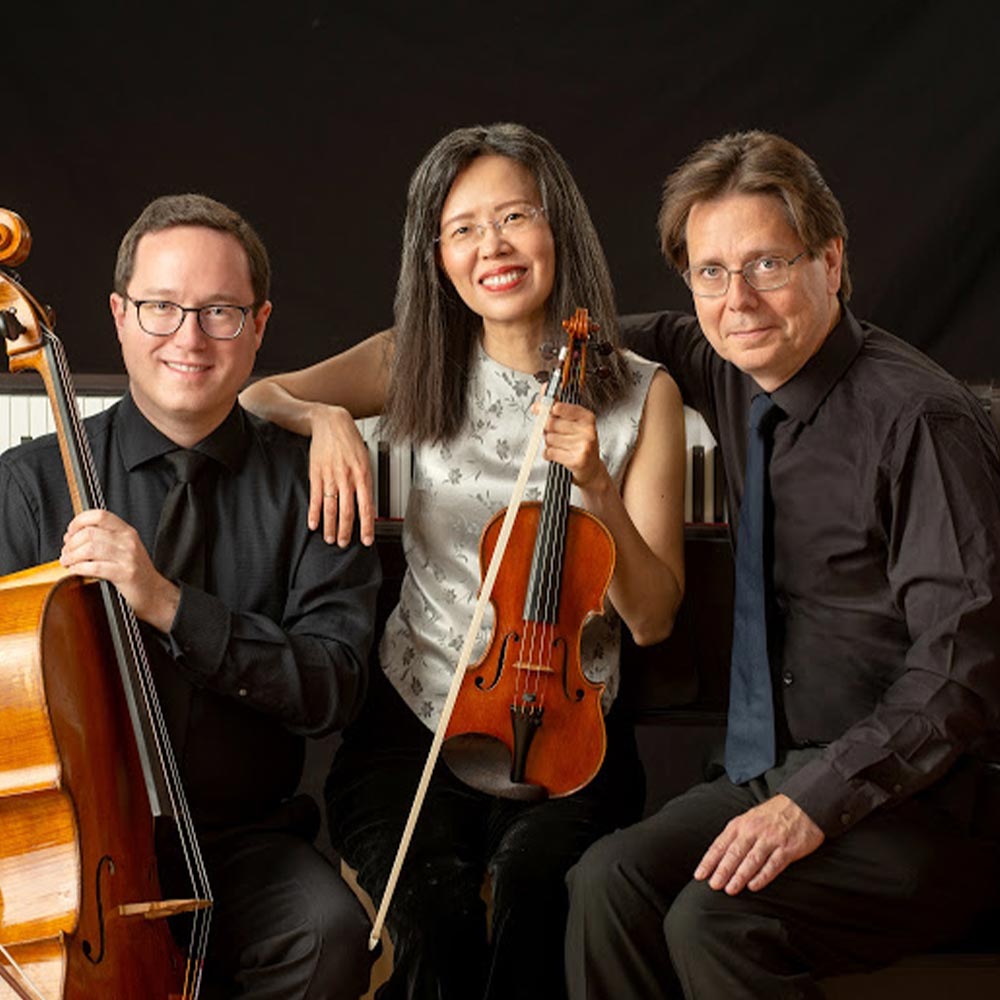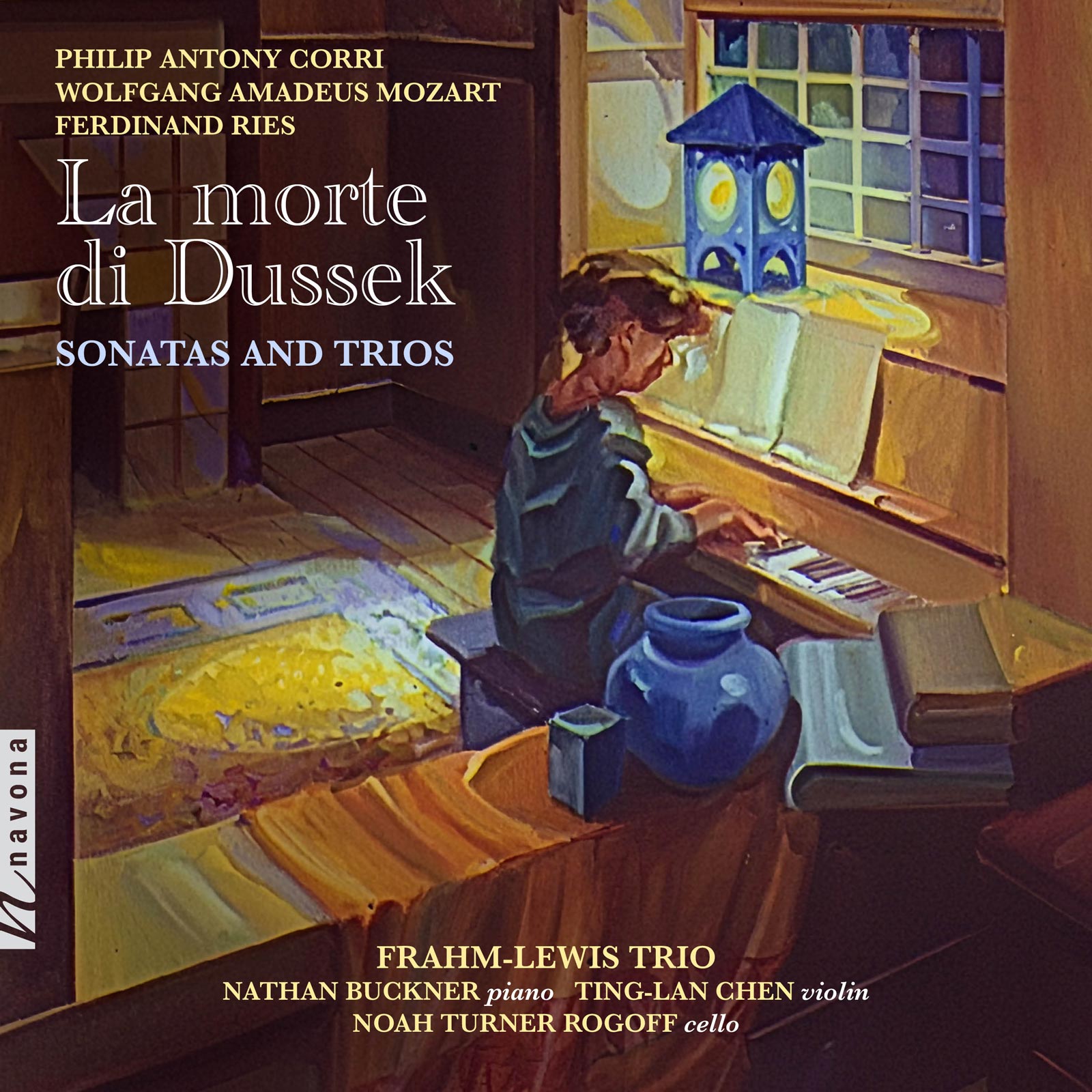
The acclaimed The Frahm-Lewis Trio entices with LA MORTE DI DUSSEK. Contrasting the works of Mozart with the lesser-known Ferdinand Ries and Philip Antony Corri, it is a veritable declaration of love to the Classical era.
Today, the Frahm-Lewis Trio is our featured ensemble on the “Inside Story,” a blog series exploring the inner workings and personalities of our composers and performers. Read on to learn about their shared passions outside of music, hopes for their new Navona Records release, and more…
What have been your biggest inspirations on your musical journey?
Frahm-Lewis Trio: The vastness and quality of the piano trio literature must count as a big inspiration. We form a faculty piano trio, and each of us has many other commitments, so our time together is not always as much as we might hope. Regardless, we are always looking to discover music new to us, both familiar and unfamiliar. This alone is often inspiration enough. The feedback we receive from audiences and listeners is also inspiring, particularly when we have the privilege of introducing people to works that become meaningful to them.
What emotions do you hope listeners will experience after hearing your work?
Frahm-Lewis Trio: As musicians and audience, we each bring our own emotional compass to any piece of music. We cannot predict exactly what we will achieve, but we hope that listeners discover something which reaches them in each of the pieces we are presenting. Also, the present choice of pairing traditional accompanied sonatas (Corri and Mozart) with a true piano trio (Ries) was quite deliberate on our part. Both the sonata and trio literatures are impressive for their monumental scope and quality. We hope listeners find it as satisfying as we do how the pieces play off of one another, and that this will result in a personal emotional journey for our listeners. We always find it so rewarding to hear from our listeners that they experience some of the joy that we get from making music.
What were your first musical experiences?
Ting-Lan: When I was about 5 years old, my mother enrolled me in the music classes offered by the Yamaha company from Japan. These classes teach young kids the fundamental musicianship and keyboard skills through creative approaches. I had great fun learning music in these classes and made the connection that I can express myself through music.
Noah: Though I don’t quite remember this per se, my parents have told me that my first musical experiences were of hearing the Boston Symphony on the lawn at Tanglewood, sometime before I began learning the cello around age 4. I began in the Suzuki method, which brought many other wonderful summer experiences at programs across the Midwest and later at the Meadowmount School of Music in New York. I’m from the CD “generation” and can remember the huge box sets with as much Mozart and Bach as I could get my hands on (and playing them every night before bed)!
Nathan: When I was less than 3 years old, my father brought home a toy phonograph which played seven-inch 45 RPM records. Years earlier while he had been stationed in the Coast Guard during the 1950s, he had amassed a small collection of classical 45s — these 45s became my music education as a 3-year-old: the Tchaikovsky Violin Concerto, Prokofiev “Classical” Symphony, Ravel “Mother Goose” Suite, and several other works. I played these records until most of them wore out. I didn’t attend my first public concert until years later, and began piano lessons after I turned seven. But my first musical experience was from recordings.
What are your passions beyond music?
Ting-Lan: I love to travel, see new places, and experience different languages/food/cultures/etc. It always gives me an acute sense that there are many ways to live lives and many different perspectives when viewing the same thing.
Noah: I share many passions with my colleagues (reading, travel, etc.) but would add that I like collecting, mainly as a way to continue educating myself about history and the dedication of craftspeople who have made beautiful things like millefiori paperweights and fountain pens.
Nathan: I enjoy traveling and reading, as well as a variety of peculiar domestic projects including caning chairs. I come from a family of sculptors and painters (my mother’s work serves as the cover for our current Navona Records recording), and my family members’ hands were never idle. I’m sure I’ve inherited some of this hand toil obsession from my family, though I certainly did not inherit their ability to draw.
What’s the greatest performance you’ve ever seen, and what made it special?
Ting-Lan: It is impossible to name one greatest performance I have ever seen because there were so many, e.g. Gil Shaham’s Beethoven Violin Concerto, Christian Tetzlaff’s Shostakovich Violin Concerto, No. 1, Maxim Vengerov’s Lalo Symphonie Espagnole, etc. I’ll share one example here: Peter Frankl’s performance of Mozart’s Piano Sonata in F Major, K. 332 at the 1998 Aspen Music Festival was a mesmerizing experience for me — his Mozart carried such simplicity and absolute purity that I had never experienced before. It totally blew my mind. This performance lingered in me for a really long time.
Noah: I consider myself very fortunate to have heard many wonderful concerts from Yo-Yo Ma, Jean-Pierre Rampal, Mstislav Rostropovich, Jordi Savall, and Murray Perahia. The concert where the stars seemed to align for me most was at Jessye Norman’s appearance at the Colmar Festival in France in 2004. Her presence and voice were unmatched! The cello is perhaps the instrument with a color and range closest to the human voice, and I am always seeking out vocal paragons to be inspired by.
Nathan: I can think of many concerts and recitals I’ve attended which were remarkable for a variety of reasons. I heard both Horowitz and Segovia in recitals during my youth, among many others. A particularly memorable event was a recital by Mieczysław Horszowski at Town Hall in New York in 1991. We had been waiting in our seats for some time when the empresario announced that Horszowski wasn’t feeling well, and that his student would be performing in his stead. On this, most of the audience up and left, and though the substitute was playing very well, many more left during his first half, so the audience was quite small by intermission. Not too many of us remained when the empresario returned to announce that Horszowski was now feeling better and would play his own Chopin second half after all! His playing was wonderful, and the circumstance was very special and intimate in a way it likely wouldn’t have been with the original full audience. I didn’t note his young substitute’s name, but he too delivered a fine performance as well and under very unenviable circumstances. I believe this was one of Horszowski’s last performances, and I’m sure there was a moral in this for the audience.
What advice would you give to your younger self if given the chance?
Ting-Lan: Ask more questions! These mentors and professors have so much to offer. Even if you don’t feel you understand the answers, you will connect the dots years later after you gain more life experience and professional experience. Also ask questions that may seem irrelevant to you at the moment — what I fully understand now is that everything in the arts is related and many things in life are connected.
Noah: That would be quite the opportunity! I’ve come to realize that music is truly a social art, but the paradox is that one must spend thousands of hours alone in a room to become proficient at it. I’d like to convince my younger self of the importance of helping to build a musical community… and not just getting absorbed in the music (which is so easy to do)!
Tell us about your first performance.
Frahm-Lewis Trio: Our trio’s very first concert together was in 2009 and one of the pieces in that program was Dvorak’s F minor Piano Trio. It was a great experience but quite challenging to put together as we had just formed our trio and were in the process of gelling together our individual playing and interpretative approaches. It is much easier now since we have been playing together now for more than a decade.
What musical mentor had the greatest impact on your artistic journey? Is there any wisdom they’ve imparted that still resonates today?
Noah: I did not understand this until quite late in my studies, but I think it is so important that teachers and mentors model what it is to be a lifelong learner and musician. I consider myself so fortunate to have learned this first hand. It is so easy as a musician to simply focus on the next performance or competition and lose the long-term perspective. I think we must always keep feeding the deep connections that led us to music in the first place.
Nathan: When teaching, I regularly quote my own teachers. Their wisdom is always on my mind, and what they once told me frequently arises at quite unexpected times, both in my teaching and in my own work. However, I do try to look beyond my own teachers, especially concerning the literature and how to approach it; music and one’s individual approach to it is never static. On this point, I try to look out for this for my own students’ sake as well.

Nathan Buckner, Ting-Lan Chen, and Noah Turner Rogoff form the Frahm-Lewis Trio, which has served as the resident faculty piano trio for the University of Nebraska at Kearney since 2008. The ensemble has appeared in many of the principal performance venues throughout Nebraska, as well as in recitals in England, Malaysia, and the United States.

